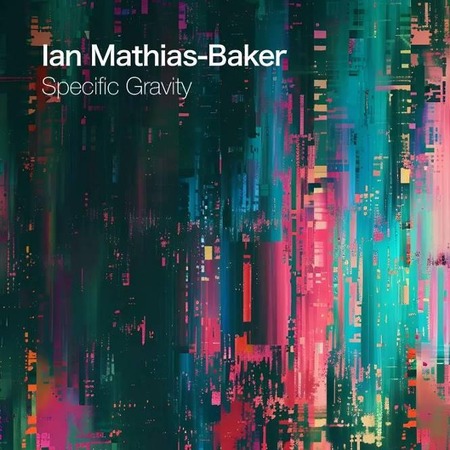
The new album Specific Gravity by composer-producer Ian Mathias-Baker is characteristically concise, but with a depth that its brevity defies. Released April 8th, 2024 the 6 track project is primarily comprised of a set of instrumental pieces combined with pieces inspired by the works of T. S. Eliot and Charles Bukowski.
Mathias-Baker has always been fiercely resistant to pigeon-holing: slipping disarmingly between dystopian glitch, baroque counterpoint and more mainstream pop or rock. One minute, he is producing bitter-sweet electro chill-out (Sungrazers), the next moment underground emo-pop (Jemma Willard) and then the next remixing some of the greats of Hip Hop. So, it’s not exactly a surprise that this new release would have been hard to predict stylistically.
The textures of Specific Gravity are principally those of the classical orchestra augmented by electronics. The musical language too draws from classical influences – at turns achingly redolent of Mahler, at others reminiscent of the brittle beauty of early Twentieth century modernism. The mood is unrelentingly melancholic – these aren’t merely stylistic affectations but vehicles to express profound emotion. Indeed, the whole collection seems to be the expression of profound grief for some unspoken tragedy. While the four ‘Mythic Texts’ that comprise than half of the collection suggest that that tragedy might be something ‘mythic’ or archetypal, the album title implies that there is actually some quite specific thing that is being grieved for. The nature of that thing is more clearly illuminated in an essay published to mark the release.
The four ‘Mythic Texts’ frame the collection. In between are two poetic settings reminiscent of Mathias-Baker’s previous settings of the work of Robert Frost. In this case, the poems treated are Charles Bukowski’s Man Mowing the Lawn Across the Way from Me and T.S.Eliot’s The Hollow Men.
The poetic settings do nothing to lift the mood. The Bukowski tells of the limited horizons of the majority of mankind. The text is abridged and its dark imagery of girls sharpening their knives, removed from the context of the full poem, takes on a more existential menace. The sound world, in contrast to the orchestration of the rest of the album is minimal, ambient even, with an acoustic piano run through delay lines, and the sharpening of the blades mirrored in tremolando distorted electric guitars.
The Eliot poem is categorically bleak and portentous. Written after the horrors of World War I had shaken the developed world from its complacent belief in continual societal progress, Eliot’s recounting of the horrors that men can do to each other is set in a dizzying orchestral kaleidoscope in which the tension only finds release in banality. ‘This is the way the world ends – not with a bang but a whimper’ the spoken voice intones over a kitsch pop groove punctuated by random electronica – the sound of the machines taking over the thinking world perhaps.
The fourth Mythic Text is the briefest of all and like the Chorus in a Greek tragedy, relates to the audience the lessons to be learned from the drama that has unfolded in the previous scenes. The situation is tragic, it seems to say, and will end horribly. An impressionistic transcendental string elegy hints at a utopia tantalisingly beyond our reach before collapsing once again into a dissonant cadence.
And in a final nod to the hubris of humans who have done nothing to ameliorate the situation but are now glued to the unfolding spectacle, as the music fades we hear the strains of a discordant theatre organ.
Specific Gravity is available across all platforms now.
Website: https://ian.mathias-baker.com/#
Spotify: https://open.spotify.com/artist/071HzHmRc0SdYO1n6oLhxc?si=zVnnCW3LSuiU9w9HgNjNWA
Youtube: https://www.youtube.com/channel/UCu11BRk9-0ue0CIiI4_XruA
